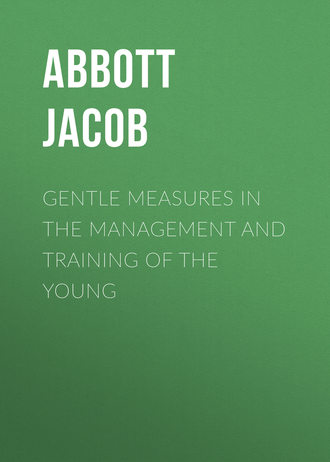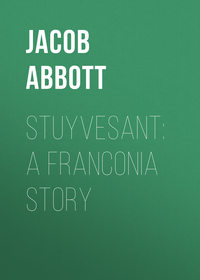
Gentle Measures in the Management and Training of the Young
Let no one suppose, from these illustrations, that they are intended to inculcate the idea that a father is to lay aside the parental counsels and instructions that he has been accustomed to give to his children, and replace them by talks about skates! They are only intended to show one aspect of the difference of effect produced by the two kinds of conversation, and that the father, if he wishes to gain and retain an influence over the hearts of his boys, must descend sometimes into the world in which they live, and with which their thoughts are occupied, and must enter it, not merely as a spectator, or a fault-finder, or a counsellor, but as a sharer, to some extent, in the ideas and feelings which are appropriate to it.
Ascendency over the Minds of ChildrenSympathizing with children in their own pleasures and enjoyments, however childish they may seem to us when we do not regard them, as it were, with children's eyes, is, perhaps, the most powerful of all the means at our command for gaining a powerful ascendency over them. This will lead us not to interfere with their own plans and ideas, but to be willing that they should be happy in their own way. In respect to their duties, those connected, for example, with their studies, their serious employments, and their compliance with directions of any kind emanating from superior authority, of course their will must be under absolute subjection to that of those who are older and wiser than they. In all such things they must bring their thoughts and actions into accord with ours. In these things they must come to us, not we to them. But in every thing that relates to their child-like pleasures and joys, their modes of recreation and amusement, their playful explorations of the mysteries of things, and the various novelties around them in the strange world into which they find themselves ushered—in all these things we must not attempt to bring them to us, but must go to them. In this, their own sphere, the more perfectly they are at liberty, the better; and if we join them in it at all, we must do so by bringing our ideas and wishes into accord with theirs.
Foolish FearsThe effect of our sympathy with children in winning their confidence and love, is all the more powerful when it is exercised in cases where they are naturally inclined not to expect sympathy—that is, in relation to feelings which they would suppose that older persons would be inclined to condemn. Perhaps the most striking example of this is in what is commonly called foolish fears. Now a fear is foolish or otherwise, not according to the absolute facts involving the supposed danger, but according to the means which the person in question has of knowing the facts. A lady, for example, in passing along the sidewalk of a great city comes to a place where workmen are raising an immense and ponderous iron safe, which, slowly rising, hangs suspended twenty feet above the walk. She is afraid to pass under it. The foreman, however, who is engaged in directing the operation, passing freely to and fro under the impending weight, as he has occasion, and without the least concern, smiles, perhaps, at the lady's "foolish fears." But the fears which might, perhaps, be foolish in him, are not so in her, since he knows the nature and the strength of the machinery and securities above, and she does not. She only knows that accidents do sometimes happen from want of due precaution in raising heavy weights, and she does not know, and has no means of knowing, whether or not the due precautions have been taken in this case. So she manifests good sense, and not folly, in going out of her way to avoid all possibility of danger.
This is really the proper explanation of a large class of what are usually termed foolish fears. Viewed in the light of the individual's knowledge of the facts in the case, they are sensible fears, and not foolish ones at all.
A girl of twelve, from the city, spending the summer in the country, wishes to go down to the river to join her brothers there, but is stopped by observing a cow in a field which she has to cross. She comes back to the house, and is there laughed at for her foolishness in being; "afraid of a cow!"
But why should she not be afraid of a cow? She has heard stories of people being gored by bulls, and sometimes by cows, and she has no means whatever of estimating the reality or the extent of the danger in any particular case. The farmer's daughters, however, who laugh at her, know the cow in question perfectly well. They have milked her, and fed her, and tied her up to her manger a hundred times; so, while it would be a very foolish thing for them to be afraid to cross a field where the cow was feeding, it is a very sensible thing for the stranger-girl from the city to be so.
Nor would it certainly change the case much for the child, if the farmer's girls were to assure her that the cow was perfectly peaceable, and that there was no danger; for she does not know the girls any better than she does the cow, and can not judge how far their statements or opinions are to be relied upon. It may possibly not be the cow they think it is. They are very positive, it is true; but very positive people are often mistaken. Besides, the cow may be peaceable with them, and yet be disposed to attack a stranger. What a child requires in such a case is sympathy and help, not ridicule.
This, in the case supposed, she meets in the form of the farmer's son, a young man browned in face and plain in attire, who comes along while she stands loitering at the fence looking at the cow, and not daring after all, notwithstanding the assurances she has received at the house, to cross the field. His name is Joseph, and he is a natural gentleman—a class of persons of whom a much larger number is found in this humble guise, and a much smaller number in proportion among the fashionables in elegant life, than is often supposed. "Yes," says Joseph, after hearing the child's statement of the case, "you are right. Cows are sometimes vicious, I know; and you are perfectly right to be on your guard against such as you do not know when you meet them in the country. This one, as it happens, is very kind; but still, I will go through the field with you."
So he goes with her through the field, stopping on the way to talk a little to the cow, and to feed her with an apple which he has in his pocket.
It is in this spirit that the fears, and antipathies, and false imaginations of children are generally to be dealt with; though, of course, there may be many exceptions to the general rule.
When Children are in the WrongThere is a certain sense in which we should feel a sympathy with children in the wrong that they do. It would seem paradoxical to say that in any sense there should be sympathy with sin, and yet there is a sense in which this is true, though perhaps, strictly speaking, it is sympathy with the trial and temptation which led to the sin, rather than with the act of transgression itself. In whatever light a nice metaphysical analysis would lead us to regard it, it is certain that the most successful efforts that have been made by philanthropists for reaching the hearts and reforming the conduct of criminals and malefactors have been prompted by a feeling of compassion for them, not merely for the sorrows and sufferings which they have brought upon themselves by their wrongdoing, but for the mental conflicts which they endured, the fierce impulses of appetite and passion, more or less connected with and dependent upon the material condition of the bodily organs, under the onset of which their feeble moral sense, never really brought into a condition of health and vigor, was over-borne. These merciful views of the diseased condition and action of the soul in the commission of crime are not only in themselves right views for man to take of the crimes and sins of his fellow-man, but they lie at the foundation of all effort that can afford any serious hope of promoting reformation.
This principle is eminently true in its application to children. They need the influence of a kind and considerate sympathy when they have done wrong, more, perhaps, than at any other time; and the effects of the proper manifestation of this sympathy on the part of the mother will, perhaps, be greater and more salutary in this case than in any other. Of course the sympathy must be of the right kind, and must be expressed in the right way, so as not to allow the tenderness or compassion for the wrong-doer to be mistaken for approval or justification of the wrong.
Case supposedA boy, for instance, comes home from school in a state of great distress, and perhaps of indignation and resentment, on account of having been punished. Mothers sometimes say at once, in such a case, "I don't pity you at all. I have no doubt you deserved it." This only increases the tumult of commotion in the boy's mind, without at all tending to help him to feel a sense of his guilt. His mind, still imperfectly developed, can not take cognizance simultaneously of all the parts and all the aspects of a complicated transaction. The sense of his wrong-doing, which forms in his teacher's and in his mother's mind so essential a part of the transaction, is not present in his conceptions at all. There is no room for it, so totally engrossed are all his faculties with the stinging recollections of suffering, the tumultuous emotions of anger and resentment, and now with the additional thought that even his mother has taken part against him. The mother's conception of the transaction is equally limited and imperfect, though in a different way. She thinks only that if she were to treat the child with kindness and sympathy, she would be taking the part of a bad boy against his teacher; whereas, in reality, she might do it in such a way as only to be taking the part of a suffering boy against his pain.
It would seem that the true and proper course for a mother to take with a child in such a case would be to soothe and calm his agitation, and to listen, if need be, to his account of the affair, without questioning or controverting it at all, however plainly she may see that, under the blinding and distorting influence of his excitement, he is misrepresenting the facts. Let him tell his story. Listen to it patiently to the end. It is not necessary to express or even to form an opinion on the merits of it. The ready and willing hearing of one side of a case does not commit the tribunal to a decision in favor of that side. On the other hand, it is the only way to give weight and a sense of impartiality to a decision against it.
Thus the mother may sympathize with her boy in his troubles, appreciate fully the force of the circumstances which led him into the wrong, and help to soothe and calm his agitation, and thus take his part, and place herself closely to him in respect to his suffering, without committing herself at all in regard to the original cause of it; and then, at a subsequent time, when the tumult of his soul has subsided, she can, if she thinks best, far more easily and effectually lead him to see wherein he was wrong.
CHAPTER XII. COMMENDATION AND ENCOURAGEMENT
We are very apt to imagine that the disposition to do right is, or ought to be, the natural and normal condition of childhood, and that doing wrong is something unnatural and exceptional with children. As a consequence, when they do right we think there is nothing to be said. That is, or ought to be, a matter of course. It is only when they do wrong that we notice their conduct, and then, of course, with censure and reproaches. Thus our discipline consists mainly, not in gently leading and encouraging them in the right way, but in deterring them, by fault-finding and punishment, from going wrong.
Now we ought not to forget that in respect to moral conduct as well as to mental attainments children know nothing when they come into the world, but have every thing to learn, either from the instructions or from the example of those around them. We do not propose to enter at all into the consideration of the various theological and metaphysical theories held by different classes of philosophers in respect to the native constitution and original tendencies of the human soul, but to look at the phenomena of mental and moral action in a plain and practical way, as they present themselves to the observation of mothers in the every-day walks of life. And in order the better to avoid any complication with these theories, we will take first an extremely simple case, namely, the fault of making too much noise in opening and shutting the door in going in and out of a room. Georgie and Charlie are two boys, both about five years old, and both prone to the same fault. We will suppose that their mothers take opposite methods to correct them; Georgie's mother depending upon the influence of commendation and encouragement when he does right, and Charlie's, upon the efficacy of reproaches and punishments when he does wrong.
One MethodGeorgie, eager to ask his mother some question, or to obtain some permission in respect to his play, bursts into her room some morning with great noise, opening and shutting the door violently, and making much disturbance. In a certain sense he is not to blame for this, for he is wholly unconscious of the disturbance he makes. The entire cognizant capacity of his mind is occupied with the object of his request. He not only had no intention of doing any harm, but has no idea of his having done any.
His mother takes no notice of the noise he made, but answers his question, and he goes away making almost as much noise in going out as he did in coming in.
The next time he comes in it happens—entirely by accident, we will suppose—that he makes a little less noise than before. This furnishes his mother with her opportunity.
"Georgie," she says, "I see you are improving."
"Improving?" repeats Georgie, not knowing to what his mother refers.
"Yes," said his mother; "you are improving, in coming into the room without making a noise by opening and shutting the door. You did not make nearly as much noise this time as you did before when you came in. Some boys, whenever they come into a room, make so much noise in opening and shutting the door that it is very disagreeable. If you go on improving as you have begun, you will soon come in as still as any gentleman."
The next time that Georgie comes in, he takes the utmost pains to open and shut the door as silently as possible.
He makes his request. His mother shows herself unusually ready to grant it.
"You opened and shut the door like a gentleman," she says. "I ought to do every thing for you that I can, when you take so much pains not to disturb or trouble me."
Another MethodCharlie's mother, on the other hand, acts on a different principle. Charlie comes in sometimes, we will suppose, in a quiet and proper manner. His mother takes no notice of this. She considers it a matter of course. By-and-by, however, under the influence of some special eagerness, he makes a great noise. Then his mother interposes. She breaks out upon him with,
"Charlie, what a noise you make! Don't you know better than to slam the doer in that way when you come in? If you can't learn to make less noise in going in and out, I shall not let you go in and out at all."
Charlie knows very well that this is an empty threat. Still, the utterance of it, and the scolding that accompanies it, irritate him a little, and the only possible good effect that can be expected to result from it is to make him try, the next time he comes in, to see how small an abatement of the noise he usually makes will do, as a kind of make-believe obedience to his mother's command. He might, indeed, honestly answer his mother's angry question by saying that he does not know better than to make such a noise. He does not know why the noise of the door should be disagreeable to his mother. It is not disagreeable to him. On the contrary, it is agreeable. Children always like noise, especially if they make it themselves. And although Charlie has often been told that he must not make any noise, the reason for this—namely, that though noise is a source of pleasure, generally, to children, especially when they make it themselves, it is almost always a source of annoyance and pain to grown persons—has never really entered his mind so as to be actually comprehended us a practical reality. His ideas in respect to the philosophy of the transaction are, of course, exceedingly vague; but so far as he forms any idea, it is that his mother's words are the expression of some mysterious but unreasonable sensitiveness on her part, which awakens in her a spirit of fault-finding and ill-humor that vents itself upon him in blaming him for nothing at all; or, as he would express it more tersely, if not so elegantly, that she is "very cross." In other words, the impression made by the transaction upon his moral sense is that of wrong-doing on his mother's part, and not at all on his own.
It is evident, when we thus look into the secret workings of this method of curing children of their faults, that even when it is successful in restraining certain kinds of outward misconduct, and is thus the means of effecting some small amount of good, the injury which it does by its reaction on the spirit of the child may be vastly greater, through the irritation and ill-humor which it occasions, and the impairing of his confidence in the justice and goodness of his mother. Before leaving this illustration, it must be carefully observed that in the first-mentioned case—namely, that of Georgie—the work of curing the fault in question is not to be at all considered as effected by the step taken by his mother which has been already described. That was only a beginning—a right beginning, it is true, but still only a beginning. It produced in him a cordial willingness to do right, in one instance. That is a great thing, but it is, after all, only one single step. The work is not complete until a habit of doing right is formed, which is another thing altogether, and requires special and continual measures directed to this particular end. Children have to be trained in the way they should go—not merely shown the way, and induced to make a beginning of entering it. We will now try to show how the influence of commendation and encouragement may be brought into action in this more essential part of the process.
Habit to be FormedHaving taken the first step already described, Georgie's mother finds some proper opportunity, when she can have the undisturbed and undivided attention of her boy—perhaps at night, after he has gone to his crib or his trundle-bed, and just before she leaves him; or, perhaps, at some time while she is at work, and he is sitting by her side, with his mind calm, quiet, and unoccupied.
"Georgie," she says, "I have a plan to propose to you."
Georgie is eager to know what it is.
"You know how pleased I was when you came in so still to-day."
Georgie remembers it very well.
"It is very curious," continued his mother, "that there is a great difference between grown people and children about noise. Children like almost all kinds of noises very much, especially, if they make the noises themselves; but grown people dislike them even more, I think, than children like them. If there were a number of boys in the house, and I should tell them that they might run back and forth through the rooms, and rattle and slam all the doors as they went as loud as they could, they would like it very much. They would think it excellent fun."
"Yes," says Georgie, "indeed, they would. I wish you would let us do it some day."
"But grown people," continues his mother, "would not like such an amusement at all. On the contrary, such a racket would be excessively disagreeable to them, whether they made it themselves or whether somebody else made it. So, when children come into a room where grown people are sitting, and make a noise in opening and shutting the door, it is very disagreeable. Of course, grown people always like those children the best that come into a room quietly, and in a gentlemanly and lady-like manner."
As this explanation comes in connection with Georgia's having done right, and with the commendation which he has received for it, his mind and heart are open to receive it, instead of being disposed to resist and exclude it, as he would have been if the same things exactly had been said to him in connection with censure and reproaches for having acted in violation of the principle.
"Yes, mother," says he, "and I mean always to open and shut the door as still as I can."
"Yes, I know you mean to do so," rejoined his mother, "but you will forget, unless you have some plan to make you remember it until the habit is formed. Now I have a plan to propose to help you form the habit. When you get the habit once formed there will be no more difficulty.
"The plan is this: whenever you come into a room making a noise, I will simply say, Noise. Then you will step back again softly and shut the door, and then come in again in a quiet and proper way. You will not go back for punishment, for you would not have made the noise on purpose, and so would not deserve any punishment. It is only to help you remember, and so to form the habit of coming into a room in a quiet and gentlemanly manner."
Now Georgie, especially if all his mother's management of him is conducted in this spirit, will enter into this plan with great cordiality.
"I should not propose this plan," continued his mother, "if I thought that when I say Noise, and you have to go out and come in again, it would put you out of humor, and make you cross or sullen. I am sure you will be good-natured about it, and even if you consider it a kind of punishment, that you will go out willingly, and take the punishment like a man; and when you come in again you will come in still, and look pleased and happy to find that you are carrying out the plan honorably."
Then if, on the first occasion when he is sent back, he does take it good-naturedly, this must be noticed and commended.
Now, unless we are entirely wrong in all our ideas of the nature and tendencies of the infantile mind, it is as certain that a course of procedure like this will be successful in curing the fault which is the subject of treatment, as that water will extinguish fire. It cures it, too, without occasioning any irritation, annoyance, or ill-humor in the mind either of mother or child. On the contrary, it is a source of real satisfaction and pleasure to them both, and increases and strengthens the bond of sympathy by which their hearts are united to each other.
The Principle involvedIt must be understood distinctly that this case is given only as an illustration of a principle which is applicable to all cases. The act of opening and shutting a door in a noisy manner is altogether too insignificant a fault to deserve this long discussion of the method of curing it, were it not that methods founded on the same principles, and conducted in the same spirit, are applicable universally in all that pertains to the domestic management of children. And it is a method, too, directly the opposite of that which is often—I will not say generally, but certainly very often—pursued. The child tells the truth many times, and in some cases, perhaps, when the inducement was very strong to tell an untruth. We take no notice of these cases, considering it a matter of course that he should tell the truth. We reserve our action altogether for the first case when, overcome by a sudden temptation, he tells a lie, and then interpose with reproaches and punishment. Nineteen times he gives up what belongs to his little brother or sister of his own accord, perhaps after a severe internal struggle. The twentieth time the result of the struggle goes the wrong way, and he attempts to retain by violence what does not belong to him. We take no notice of the nineteen cases when the little fellow did right, but come and box his ears in the one case when he does wrong.
Origin of the ErrorThe idea on which this mode of treatment is founded—namely, that it is a matter of course that children should do right, so that when they do right there is nothing to be said, and that doing wrong is the abnormal condition and exceptional action which alone requires the parent to interfere—is, to a great extent, a mistake. Indeed, the matter of course is all the other way. A babe will seize the plaything of another babe without the least compunction long after it is keenly alive to the injustice and wrongfulness of having its own playthings taken by any other child. So in regard to truth. The first impulse of all children, when they have just acquired the use of language, is to use it in such a way as to effect their object for the time being, without any sense of the sacred obligation of making the words always correspond truly with the facts. The principles of doing justice to the rights of others to one's own damage, and of speaking the truth when falsehood would serve the present purpose better, are principles that are developed or acquired by slow degrees, and at a later period. I say developed or acquired—for different classes of metaphysicians and theologians entertain different theories in respect to the way by which the ideas of right and of duty enter into the human mind. But all will agree in this, that whatever may be the origin of the moral sense in man, it does not appear as a practical element of control for the conduct till some time after the animal appetites and passions have begun to exercise their power. Whether we regard this sense as arising from a development within of a latent principle of the soul, or as an essential element of the inherited and native constitution of man, though remaining for a time embryonic and inert, or as a habit acquired under the influence of instruction and example, all will admit that the period of its appearance as a perceptible motive of action is so delayed, and the time required for its attaining sufficient strength to exercise any real and effectual control over the conduct extends over so many of the earlier years of life, that no very material help in governing the appetites and passions and impulses can be reasonably expected from it at a very early period. Indeed, conscience, so far as its existence is manifested at all in childhood, seems to show itself chiefly in the form of the simple fear of detection in what there is reason to suppose will lead, if discovered, to reproaches or punishment.









